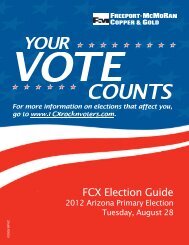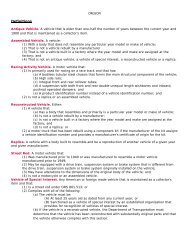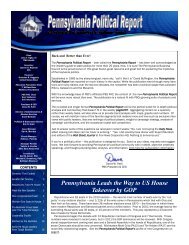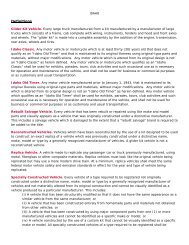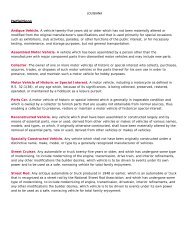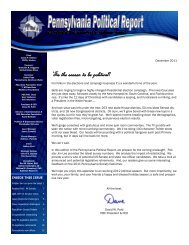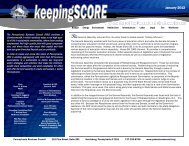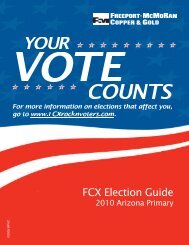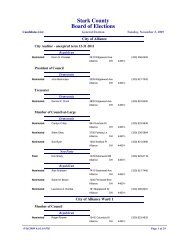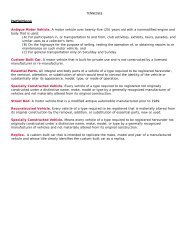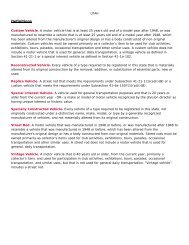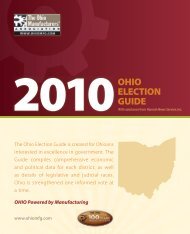July 2011 - BIPAC
July 2011 - BIPAC
July 2011 - BIPAC
Create successful ePaper yourself
Turn your PDF publications into a flip-book with our unique Google optimized e-Paper software.
<strong>July</strong> <strong>2011</strong><br />
Budget Energy Environment Health Care Infrastructure Labor Legal Tax Workforce<br />
The Pennsylvania Business Council (PBC) envisions a<br />
Commonwealth in which residents enjoy a very high quality<br />
of life in sustainable communities, where those seeking<br />
employment find high quality jobs with good compensation,<br />
and where those who invest their capital and hard<br />
work can grow firms that flourish and are profitable.<br />
In order to create and renew this vision of Pennsylvania,<br />
PBC is working aggressively with more than 30 business<br />
associations in a partnership to define key long-term<br />
policy strategies and solutions that make the Commonwealth<br />
more competitive; and elect candidates for office<br />
who offer the best capacity to create and sustain a better<br />
Pennsylvania.<br />
keepingSCORE lays out the public policy goals of a unified<br />
business community, the current “score” of efforts to<br />
achieve those aims, and the grassroots actions that support<br />
these public policy goals.<br />
A<br />
n odyssey to improve Pennsylvania’s legal climate that has spanned a generation, just met its first major<br />
success. But more work and a lengthy journey still lie ahead, say some of the Commonwealth’s preeminent<br />
business leaders.<br />
On Monday, June 27, the Pennsylvania House of Representatives adopted by a 116-83 vote, the Fair Share Act sending<br />
the joint and several reform measure to Governor Tom Corbett for his signature. Governor Corbett signed the Act the next<br />
day in the Capitol Rotunda stating that it was a symbolic location because of the unified efforts of both chambers.<br />
“This is an important win for making Pennsylvania more competitive,” said Pennsylvania Business Council Chairman Denis<br />
O’Brien, President and CEO of PECO. “But it’s just the first step in comprehensive legal reform.”<br />
The Fair Share Act, says Thomas L. VanKirk, Chairman of Buchanan Ingersoll & Rooney, and a PBC Policy Roundtable<br />
member, will make civil lawsuits fair and more predictable. “The legislation says that, from now on, liability shall be<br />
several – but not joint – where the defendant's liability for the damage or loss is less than 60 percent of the total liability of<br />
all defendants, except under four exempted circumstances,” explained VanKirk. “This means that a defendant who bears<br />
the preponderance of responsibility can still be held jointly liable, but parties who bear little or only partial responsibility for<br />
an injury or loss could be held to pay no more than their proportional share of the judgment.” VanKirk commented that<br />
defendants are often inclined to settle a lawsuit rather than litigate even if they played little role in the case because they<br />
fear the random, lottery-like nature of the civil court system that might hold them to pay all or most of the judgment. “Even<br />
if they win, a defendant can spend huge sums on legal fees defending themselves” said VanKirk, “so they are apt to settle<br />
as the lower cost alternative.”<br />
Chair<br />
Denis P. O’Brien<br />
PECO<br />
Secretary<br />
Gretchen R. Haggerty<br />
United States Steel<br />
Treasurer<br />
Kathy Pape<br />
Pennsylvania American Water<br />
Education Foundation Chair<br />
T. William Boxx<br />
McKenna Foundation<br />
PEG PAC Chair<br />
Gary Veshecco<br />
Erie Insurance<br />
President & CEO<br />
David W. Patti<br />
Dir of Admin & Member Services<br />
Suzie Barbush<br />
Political & Grassroots Director<br />
Christopher Nicholas<br />
Issue Manager<br />
Carl A. Marrara<br />
Event Manager<br />
Ashley L. Parsells<br />
Consultants<br />
Earl M. Baker, PhD<br />
Michael E. Greenberg, PhD<br />
Kathleen Woolever<br />
John T. Tighe, III, founder and CEO of TMG Health said joint and several reform benefits a wide range of Pennsylvania<br />
interests. “Small and large businesses alike have identified Pennsylvania’s legal climate as a hindrance for starting and<br />
growing an enterprise in the Commonwealth,” said Tighe. “But the inherent unfairness of joint liability has hurt our<br />
doctors, hospitals, nursing homes, colleges, universities, and<br />
municipal governments. Passage of the Fair Share Act<br />
benefits everyone and ultimately saves tax dollars.”<br />
O’Brien said that PBC, other business associations, medical<br />
professionals and health care providers, non-profits and local<br />
government organizations will continue to press for other legal<br />
reforms that make Pennsylvania more competitive. “There<br />
was a lot of hard work through a coalition of interests,” said<br />
O’Brien. “And we benefitted from the strong leadership of<br />
House Majority Leader Mike Turzai, Senate Majority Leader<br />
Dominic Pileggi, and Governor Tom Corbett – all of whom<br />
made passage of the Fair Share Act a top <strong>2011</strong> priority.”<br />
Read more about the Fair Share Act and other legal reform<br />
legislation on page 7.<br />
Pennsylvania Business Council 116 Pine Street, Suite 201 Harrisburg, Pennsylvania 17101 717-232-8700 www.pabusinesscouncil.org
Budget Energy Environment Health Care Infrastructure Labor Legal Tax Workforce<br />
DEFINING SUCCESS<br />
Oppose increasing taxes on the job creators. Oppose increasing<br />
the Personal Income Tax rate and the Sales & Use Tax.<br />
Oppose “Combined Reporting.”<br />
Cut spending.<br />
Empower a “Grace Commission” to address costs.<br />
Limit General Fund spending growth.<br />
Limit irresponsible debt.<br />
Change the budgeting process.<br />
Reinstate “sunset” review and termination.<br />
Conduct performance audits.<br />
GETTING IN THE GAME<br />
Click here to be directed to the Pennsylvania Office of the<br />
Budget website and explore the FY <strong>2011</strong>-2012 budget.<br />
For the first time in eight years, Pennsylvania had an on-time budget. In addition, the <strong>2011</strong>-12 total operating<br />
budget represented the first reduction in spending in more than 40 years. Negotiations went down to the<br />
wire as Governor Corbett signed the budget with just 13 minutes left in the fiscal year. This budget included<br />
no new taxes, no tax increases, and no fee increases.<br />
One of the largest cuts was seen in the state operated and state related higher education institutions. Originally,<br />
Governor Tom Corbett proposed a total 50 percent funding cut of Pennsylvania State System of Higher<br />
Education (PASSHE) schools and state related institutions: Penn State, Temple, Pittsburgh, and Lincoln.<br />
Higher education fared well in budget debates and saw more than half of those funds restored, but they still<br />
did suffer an 18 percent cut.<br />
The Department of Public Welfare, a department often pointed for “waste, fraud, and abuse,” due to recent<br />
audits by Auditor General Jack Wagner, saw a mere .04 percent cut from current expenditures. And<br />
lastly, Pennsylvania ended the 2010-11 fiscal year with a $785 million revenue surplus, thanks to betterthan-expected<br />
tax collections. That money will most likely be used to pay back $850 million to the Mcare<br />
Fund that was raided two years ago by then, Governor Edward G. Rendell. The ruling on whether the state<br />
will be responsible for paying those funds back is currently in the court system but should be ruled on in the<br />
coming months.<br />
SB 105 introduced by Senator Patrick Browne (R-Lehigh), would establish the Pennsylvania Web Accountability,<br />
Transparency, and Contract Hub (PennWATCH) Act. The Independent Fiscal Office would develop,<br />
implement and maintain a single, searchable, public website containing annual appropriation information<br />
and funding action or expenditure information of commonwealth agencies. The searchable budget databasedriven<br />
website would detail information concerning taxpayer expenditures and investments. For example, by<br />
August 31 of each year, the source tax and amount for each agency appropriation must be provided along<br />
with employment information concerning the agency and links to each agency website. By February 15,<br />
2012, employee compensation for each agency shall be listed on the website. The website will be developed<br />
by December <strong>2011</strong>. Thirteen states have a system in place similar to PennWATCH including: Hawaii, Indiana,<br />
Louisiana, Minnesota, Mississippi, Missouri, Nevada, Oklahoma, South Carolina, Texas, Utah, Virginia, and<br />
Washington. The bill passed the Senate in late April and moved out of the House Appropriations Committee<br />
shortly thereafter. The bill now awaits passage in the House.<br />
Pennsylvania Business Council 116 Pine Street, Suite 201 Harrisburg, Pennsylvania 17101 717-232-8700 www.pabusinesscouncil.org
Budget Energy Environment Health Care Infrastructure Labor Legal Tax Workforce<br />
DEFINING SUCCESS<br />
To be competitive, Pennsylvania businesses must be able to<br />
procure plentiful, reliable, and affordable energy. This requires<br />
the infrastructure and regulatory climate that fosters generation,<br />
transmission, and distribution systems throughout the<br />
Commonwealth. Specifics:<br />
Develop and exploit all energy sources and technologies allowing<br />
market forces to determine eventual “winners and losers”<br />
without government favoritism or sanction.<br />
Facilitate the development of Marcellus Shale natural gas<br />
reserves.<br />
Oppose severance tax until the industry is successfully rooted<br />
in the Commonwealth and then consider only in light of competitiveness<br />
with other states.<br />
GETTING IN THE GAME<br />
Looking for educational programs on energy related topics Go<br />
to the Energy Utility Consultants Inc. website that has a list of<br />
over 100 webcasts available for purchase. Click here for more<br />
information.<br />
FYI<br />
No topic may be getting more media attention in Pennsylvania than Marcellus Shale and the possibility of an<br />
“Impact Fee.” Senate Bill 1100, sponsored by Senator Joseph Scarnatti (R-Jefferson), amends Title 58 (Oil<br />
and Gas) by imposing an impact fee on drillers of natural gas in the Marcellus Shale formation. Provisions of<br />
the legislation would not allow any money obtained from the impact fee to be directed to the Commonwealth's<br />
General Fund. The fee would be structured in a way that would charge well operators to pay<br />
$40,000 in the first year of production; $30,000 in the second year of production; $20,000 in the third year<br />
of production; and $10,000 in the fourth through tenth years of production. Sixty percent of the funds shall<br />
be deposited into a shale gas impact account. This amount is to be distributed as follows: 36 percent to<br />
counties with producing wells; 37 percent for municipalities with producing wells; and 27 percent to all other<br />
municipalities. Portions of the impact fee revenue will be used to address statewide infrastructure and environmental<br />
impacts. However, any municipality zoning natural gas drilling out of their region will not reap any<br />
benefits of the impact fees. The bill is currently still in the Senate Appropriations Committee.<br />
Many heralded Pennsylvania as a leader in natural gas production with the discovery of the gas in the Marcellus<br />
Shale formation. Now there may be no questioning Pennsylvania’s force as a leader in the natural gas<br />
sector. Another underground strip of shale in Pennsylvania, much deeper than the Marcellus formation, is<br />
thought to hold rich and abundant gas. Utica Shale stretches far beyond the edges of the Marcellus, covering<br />
most of Pennsylvania, New York and West Virginia, along with eastern Ohio. Currently, eastern Ohio is being<br />
developed the most but Range Resources Corp. is exploring the Utica formation in Southwestern, Pennsylvania.<br />
In an interview with the Pittsburgh Tribune-Review, Dr. Terry Engelder, Professor of Geosciences at<br />
Penn State University said, “A number of companies are taking a careful look at this shale, and in eastern<br />
Ohio there's been a fair amount of leasing.” The article goes on to state, “The Marcellus shale formation that<br />
sparked a rush of drillers to Pennsylvania and other Appalachian states averages 7,000 feet deep, and the<br />
older, thicker Utica layer runs 2,000 or more feet below that. The black Utica shale, 500 feet thick in places,<br />
dates 440 million to 460 million years.”<br />
Pennsylvania Business Council 116 Pine Street, Suite 201 Harrisburg, Pennsylvania 17101 717-232-8700 www.pabusinesscouncil.org
Budget Energy Environment Health Care Infrastructure Labor Legal Tax Workforce<br />
DEFINING SUCCESS<br />
Any state legislative or regulatory policy to reduce greenhouse<br />
gas emissions must stem from federal legislative authority;<br />
be based on sound science; recognize that a diverse<br />
fuel source is a necessary component of Pennsylvania’s<br />
economy; rely on market driven solutions to identify technologies;<br />
and provide sufficient time to bring enabling energy<br />
technologies to market.<br />
As the state moves to finalize a state water plan, and works<br />
to consider and implement regulatory programs from the<br />
variety of basin commissions and compacts involved in managing<br />
water in the Commonwealth, it must be done in a manner<br />
that does not advantage one sector of the economy to<br />
the detriment of another.<br />
Governor Tom Corbett reversed one of former-Governor Edward G. Rendell's final acts as governor by<br />
rescinding an effective moratorium on natural gas drilling on state lands. The reason cited by Governor<br />
Rendell for the moratorium was so the state could complete environmental impact assessments being<br />
conducted by the Department of Conservation and National Resources. The moratorium was significant<br />
because, sixty state parks are located above the gas-rich Marcellus Shale formation. The Pennsylvania<br />
Bulletin published on Saturday, February 19, <strong>2011</strong>, stated, “This document, which was not subject to<br />
advanced public comment or review, is being rescinded as unnecessary and redundant of existing practice.<br />
The Department is implementing Section 205(c) and will continue to do so. The Department will<br />
continue to consider the input of all applicable parties with respect to public resources outlined in Section<br />
205(c).”<br />
GETTING IN THE GAME<br />
Watch a recording of PBC’s Mandatory Monday Morning Briefing<br />
featuring Drew Crompton and Terry Bossert discussing Marcellus<br />
Shale policy issues. Click below to view:<br />
Pennsylvania Business Council 116 Pine Street, Suite 201 Harrisburg, Pennsylvania 17101 717-232-8700 www.pabusinesscouncil.org
Budget Energy Environment Health Care Infrastructure Labor Legal Tax Workforce<br />
DEFINING SUCCESS<br />
Adopt basic health plans.<br />
Allow association health plans.<br />
Oppose health care mandates.<br />
Promote Health Savings Accounts.<br />
Balance access to innovative therapy with cost-effectiveness.<br />
Require fair health care provider contracting.<br />
Adopt quality measures.<br />
Expand health information technology.<br />
Utilize best practices.<br />
Enact malpractice reform.<br />
Retire the MCARE Fund.<br />
Increase physicians in underserved areas.<br />
Encourage careers in science.<br />
GETTING IN THE GAME<br />
Check out the Pennsylvania Health Care Containment Council’s<br />
2010 Annual Report that was released this spring. Click here to<br />
access the report.<br />
FYI<br />
FYI<br />
This past winter, adultBasic ran out of time and out of money. Pennsylvania’s adultBasic program was one of only<br />
a few entirely state-funded health plans to provide coverage to low-income adults who do not qualify for Medicaid.<br />
Created in 2001, by Governor Tom Ridge, adultBasic is paid for through a combination of money from the state's<br />
tobacco settlement and the remainder was made up of donations from the state's four BlueCross and Blue Shield<br />
insurance companies. The cost of the program in 2010 was $166 million. With tobacco money decreasing and<br />
health care costs increasing, the state was not able to identify other funds to make up the deficit. The deal with the<br />
insurers was set to expire this past December, but they agreed to contribute $51 million to extend the program to<br />
the end of February. Shortly after taking office in January, Governor Corbett announced that the program was depleted<br />
of money and as such, coverage for all participants ended February 28. The state reached an agreement<br />
with Blue Cross to allow adultBasic subscribers to join another program for low-income citizens, called Special<br />
Care. The policy is not subsidized by the state and can cost up to $192 a month, opposed to adultBasic’s $36.<br />
Special Care also provides fewer benefits.<br />
Representative John Hornaman (D-Erie) and Senator Edwin Erickson (R-Chester) have both introduced legislation in<br />
their respective chambers that would establish the Physician Retention Loan Forgiveness Program in the Pennsylvania<br />
Higher Education Assistance Agency. In Rep. Hornaman’s plan, the Physician Retention Loan Forgiveness<br />
Program is established in PHEAA, which provides for up to 100% loan forgiveness for eligible physicians. US citizens<br />
licensed to practice medicine specializing in internal medicine, family medicine, pediatrics, or obstetrics and<br />
gynecology are eligible for the program. By accepting the program, the physician is mandated to practice in Pennsylvania<br />
for at least 10 years. Similarly, Senator Erickson’s plan would be based on demonstrated need, willingness<br />
to continue practicing as a physician in Pennsylvania after completing the program, and eligibility. The bill provides<br />
for the amount of loan forgiveness. A physician accepted into the program practicing full time may be reimbursed<br />
an amount up to 100% of the total loan for physician training up to $75,000, based upon a repayment assistance<br />
schedule. At large, the business community supports Physician Retention Loan Forgiveness Programs. Pennsylvania<br />
must retain more doctors and ensure coverage in rural and inner-city Pennsylvania. Insufficient numbers of<br />
doctors reduces access to health care and can increase the cost of health care. Pennsylvania ought to offer incentives<br />
to encourage physicians to practice in the state’s medically underserved areas. Loan Forgiveness programs<br />
that include stipulations based on need are one way to make Pennsylvania an attractive state in which to practice.<br />
Both pieces of legislation are in the respective chamber’s Education Committee.<br />
The Health Choices Act, sponsored by Representative Michael Peifer (R-Pike) would provide mandatory managed<br />
health care to recipients in specified areas of the Commonwealth through contracts with managed care organizations.<br />
House Bill 1480 was introduced in early April but has not received any attention until just recently. The Department<br />
of Public Welfare would administer and implement the program. In a recent hearing on the bill, Rep.<br />
Peifer said, "the issue really has to do with access to quality health care and the cost containment of this health<br />
care." He emphasized that with the expansion of managed care, hundreds of thousands of people could possibly<br />
be included on the Medicaid rolls. The bill is still in the House Health Committee.<br />
Pennsylvania Business Council 116 Pine Street, Suite 201 Harrisburg, Pennsylvania 17101 717-232-8700 www.pabusinesscouncil.org
Budget Energy Environment Health Care Infrastructure Labor Legal Tax Workforce<br />
DEFINING SUCCESS<br />
We must increase infrastructure replacement, development, and<br />
funding. Among the goals:<br />
Maintenance of current roads and bridges.<br />
Maintenance of mass transit systems.<br />
Maintenance and expansion of water and sewer systems.<br />
Expansion of energy transmission systems.<br />
Expanded rail systems and intermodal operations.<br />
GETTING IN THE GAME<br />
Please attend the September 12, <strong>2011</strong> edition of the Mandatory<br />
Monday Morning Briefing featuring PennDot Secretary Barry<br />
Schoch. Look for more information on this coming soon!<br />
Representative Richard Geist (R-Blair) introduced HB 3, a bill that would provide for public-private partnerships<br />
(P3s) regarding transportation infrastructure. The business community encourages greater private<br />
investment in improvements to our infrastructure systems by removing regulatory hurdles and providing long<br />
-term regulatory certainty. Enacting legislation for P3s – especially for adding additional capacity to current<br />
systems, will benefit Pennsylvania. However the bill was amended to include problematic language that applies<br />
prevailing wage in all P3 transportation projects. The business community supports HB 3, so long as<br />
the amendment including prevailing wage is stricken. The bill is currently in the House Transportation Committee.<br />
Pennsylvania’s infrastructure is crumbling and there is a lack of funds in this year’s budget to address the<br />
problem. Thousands of bridges have been rated “structurally deficient” by engineers because of their age<br />
and heavy use. In addition, Pennsylvania’s businesses and industries rely on our transportation network to<br />
move people and goods. The business community has been in favor of increasing vehicle registration fees,<br />
license fees, and even an increase in the gas tax. However, due to Governor Corbett’s no tax pledge these<br />
options are considered, off the table. Current PennDot Secretary, Barry Schoch, has been on record as saying<br />
the budget shortfall for transportation infrastructure is $3 billion.<br />
Pennsylvania Business Council 116 Pine Street, Suite 201 Harrisburg, Pennsylvania 17101 717-232-8700 www.pabusinesscouncil.org
Budget Energy Environment Health Care Infrastructure Labor Legal Tax Workforce<br />
DEFINING SUCCESS<br />
Limit UC to temporary, partial benefits based on actual earnings<br />
with eligibility restricted to persons unemployed through<br />
no fault of their own.<br />
Fairly compute employer UC contributions through an experience<br />
rating calculation.<br />
Compel those applying for UC benefits to register for employment<br />
search services, counseling and re-training through Pa<br />
CareerLink; and to accept work if it is offered.<br />
Adjust and limit Pennsylvania UC benefits to account for other<br />
benefits such as employer-paid severance benefits.<br />
Create a fair Workers’ Compensation Law that aims to return<br />
employees to productive, gainful employment, while providing<br />
adequate but not excessive benefits for work-related occupational<br />
injuries and illnesses.<br />
Eliminate Project Labor Agreements (PLAs) for Public Projects<br />
Reform prevailing wage law to reflect market realities and with<br />
modern thresholds.<br />
End compulsory unionism.<br />
GETTING IN THE GAME<br />
Pennsylvania Business Council Education Foundation Employment<br />
Law and Labor Policy Series:<br />
-Harrisburg, September 7<br />
-Pittsburgh, September 15<br />
-Philadelphia, September 22<br />
On June 17, the Governor signed Act 6 into law codifying the Legislature’s efforts on Senate Bill 1030, an<br />
Unemployment Compensation bill sponsored by Senator Gordner (R-Columbia). Besides providing some<br />
reform measures to Unemployment Compensation Law, SB 1030 also ensured the continuation of a federally<br />
funded 13-week extension of Unemployment Compensation benefits to about 45,000 Pennsylvanians<br />
who qualify. SB 1030 amends the Unemployment Compensation Law to provide circumstances for which<br />
an employer may be relieved of paying Unemployment Compensation benefits. For example, if work was<br />
lost due to willful misconduct connected to that work by the employee, the employer would not have to<br />
compensate that individual. SB 1030 also defines the definition of the term “credit week” to read, “any<br />
week in which the employee is paid not less than $100 (to expire December 31, 2014) and starting in<br />
2015 the definition is 16 times the minimum hourly wage required by the Minimum Wage Act.” The Act<br />
also forces those receiving unemployment benefits to actively search for a new job by posting resumes and<br />
responding to “help wanted ads” on the State’s CareerLink website. This legislation will slow the growth of<br />
the Unemployment Compensation fund; saving an average of $133 million per year over the next four<br />
years. However, the business community knows, and the Governor agrees – more needs to be done. "This<br />
legislation is a good and important step toward reforming our Unemployment Compensation Law. While<br />
these reforms will benefit employers and the workforce, there remains more to do, in the long-term, to restore<br />
the trust fund's solvency and repay our federal loans."<br />
The Pennsylvania Business Council will be hosting an Employment Law and Labor Policy Summit Series in<br />
September. The first summit will be hosted in Harrisburg on September 7, followed by a summit in Pittsburgh<br />
on September 15, and the rubber match will be in Philadelphia on September 22. All three summits<br />
will feature panels of expert attorneys, lawmakers, administration staff, and association executives. Check<br />
out the “Getting in the Game” section of this page for more information.<br />
Click here fore more information.<br />
Pennsylvania Business Council 116 Pine Street, Suite 201 Harrisburg, Pennsylvania 17101 717-232-8700 www.pabusinesscouncil.org
Budget Energy Environment Health Care Infrastructure Labor Legal Tax Workforce<br />
DEFINING SUCCESS<br />
Enact the “Fair Share Act” to reform joint and several liability.<br />
Implement reforms to reduce frivolous lawsuits.<br />
Provide meaningful product liability reform including a statue<br />
of repose for product liability actions.<br />
Enact reasonable protections for retailers who unknowingly<br />
sell a defective product.<br />
Apply to all tort actions the same “venue shopping” reforms<br />
that have reduced medical malpractice claims.<br />
Balance legal liability from the sale of food products against<br />
customers’ choices to over-indulge in these products.<br />
Work to ensure access to competitive and affordable medical<br />
malpractice insurance.<br />
Amend the Constitution to empower the Legislature to consider<br />
limits on damages.<br />
Amend the constitution to use merit selection, rather than<br />
popular election, for the appointment of state appellate<br />
judges.<br />
GETTING IN THE GAME<br />
Click here to send a letter to your legislator urging them to support<br />
“comprehensive legal reform.”<br />
Joint and Several Liability has been a focus of both the Legislature and Governor Tom Corbett early in the <strong>2011</strong>-2012 legislative<br />
session. HB 1, sponsored by Representative Curt Schroder (D-Chester) and SB 2, from Senator Jacob Corman (R-<br />
Centre) are bills that would make Pennsylvania a modified Joint and Several state. Prior to the recent passage of the Fair<br />
Share Act, Pennsylvania law allowed a defendant who was marginally responsible for injury or harm to pay 100 percent of<br />
the damages. That means, even if the defendant was found one percent liable for potential damages, the plaintiff can<br />
pursue the one percent actor for 100 percent of the monetary award. The Fair Share Act changes this. The Act would more<br />
fairly represent the defendant by making them eligible to pay 100 percent of the damages only when they are found to be<br />
60 percent or more liable for said damages. If the defendant is found less than 60 percent liable, they are only responsible<br />
to pay the percent of damage that they caused. HB 1 passed the House in May, but was held up in the Senate Judiciary<br />
Committee along with SB 2 by Senator Steward Greenleaf (R-Montgomery). Eventually, Senator Greenleaf introduced his<br />
own version of “reform” by introducing SB 1131, but provision in the legislation kept the bill from being a true Joint and<br />
Several reform. The bill was amended on the floor of the Senate by Senator Corman to mirror the original language put<br />
forth in HB 1 and SB 2. The bill passed in the Senate and was quickly moved to the House for their vote. The Governor<br />
signed the Fair Share Act into law on June 28, <strong>2011</strong>.<br />
Legal Reform Does Not End With the Fair Share Act: Look for Support From the Business Community on the Following<br />
Pieces of Legislation:<br />
Representative Gordon Denlinger (R-Lancaster) introduced HB 304 on January 27, 2010 that would provide for a statute of<br />
repose. Similarly, in the Senate, Senator Lisa Baker (R-Pike/Wayne/Wyoming/Luzerne/Monroe/Susquehanna) recently<br />
introduced legislation in the form of SB 384. Statute of repose states that any person bringing a suit against a person or<br />
business must prove the product was defective and is not more than 15 years old. As technology and science change,<br />
products over 15 years of age do not have the “best practices” as those produced today. Both bills are in their respective<br />
Judiciary Committees.<br />
HB 388, sponsored by Representative Scott W. Boyd (R-Lancaster) would enact legal reform commonly referred to as Innocent<br />
Seller Provisions. In a product liability action against a product seller, the product seller may file an affidavit certifying<br />
the correct identity of the manufacturer of the product which allegedly caused the injury, death or damage. If the product<br />
was deemed safe at the time of the sale, the seller would not be found responsible for any damages caused. Senator Lisa<br />
Baker (R-Monroe) introduced SB 383 that also protects innocent sellers. SB 383 is currently in the Senate Judiciary Committee.<br />
Representative Robert W. Godshall (R-Montgomery) is attempting to place caps on non-economic damages in medical<br />
lawsuits with the introduction of his bill, HB 299. The legislation would not apply to a health care provider if the act or omission<br />
to act in the rendering of professional services was not in good faith and in a manner amounting to gross negligence<br />
or recklessness. If passed, the bill would require a constitutional referendum to become fully enacted. The bill is currently<br />
in the House Judiciary Committee.<br />
HB 495, sponsored by Representative Keith Gillespie (R-York), would allow for a benevolent gesture or admission by health<br />
care provider. Also known as the “Apology Act” HB 495 would allow for an apology by health care provider, assisted living<br />
residence, or personal care home and not have it used against them as an admission of guilt in court. The medical community<br />
and business community have been advocates of this legislation for years because several studies have found that it<br />
could lower the number of malpractice suits. Many doctors are trained in medical schools and by their lawyers to avoid<br />
apologizing for anything unfortunate that might happen to a patient. The bill is currently in the House Judiciary Committee.<br />
Pennsylvania Business Council 116 Pine Street, Suite 201 Harrisburg, Pennsylvania 17101 717-232-8700 www.pabusinesscouncil.org
Budget Energy Environment Health Care Infrastructure Labor Legal Tax Workforce<br />
DEFINING SUCCESS<br />
Maintain the phase-out of the Capital Stock & Franchise Tax.<br />
Adopt the Single Sales Factor for the apportionment of corporate<br />
revenue subject to PA’s corporate net income tax.<br />
Eliminate the cap on the deductibility of net operating losses.<br />
Oppose the implementation of “Combined Reporting.”<br />
GETTING IN THE GAME<br />
Watch a recording of PBC’s Mandatory Monday Morning Briefing<br />
featuring Senator Bob Mensch discussing his package of tax<br />
reduction bills. Click below to view:<br />
After a heated debate in the House and Senate, Governor Tom Corbett signed Senate Bill 330, a school property<br />
tax reform. The most significant reform in SB 330 forces the local school boards and school districts to<br />
receive voter approval for any property tax increase for school districts over the rate of inflation. In addition, SB<br />
330 amends the Taxpayer Relief Act to require the school directors in school districts of the second, third, and<br />
fourth classes to adopt a resolution allowing the payment of property taxes by small businesses (>50 employees)<br />
to be made in installments.<br />
Senator Robert Mensch (R-Montgomery) put together a comprehensive package of bills that would lower the<br />
business tax burden in Pennsylvania. Currently Pennsylvania ranks 47 th in the nation in new job creation, has<br />
the third-highest unemployment compensation claims in the nation, and has the highest flat Corporate Net Income<br />
Tax in the country - second highest in the world. SB 204, SB 205, SB 206, SB 207, and SB 208 are targeted<br />
at correcting these statistics. All five bills were introduced to the Senate Finance Committee in January.<br />
SB 204 reduces the amount of each paycheck the Commonwealth takes through the state Personal Income<br />
Tax (PIT). The PIT would be reduced from 3.07 percent to 2.99 percent for not only individuals, but also<br />
for the small businesses for whom the PIT is their primary business tax.<br />
SB 205 implements a "Single Sales Factor" which is an apportionment formula for taxes that is based<br />
solely upon sales, rather than a formula that takes into account property, payroll and sales as we currently do in<br />
Pennsylvania. Apportionment formulas determine how much of a company's income will be taxable. If a multistate<br />
company is looking to grow, it will look at states that use the single sales factor rather than the threefactor<br />
apportionment formula. Unlike Pennsylvania, most states use the single-sales factor.<br />
SB 206 reduces the Corporate Net Income (CNI) tax to 6.99% by 2014. The CNI rate is currently at 9.99%.<br />
Senator Mench’s legislation would decrease this amount by 1% each year starting in 2012 and maintain a<br />
6.99% rate from 2014 thereafter. When a company is looking to begin operations or relocate somewhere, the<br />
CNI is one of the first things that it looks at in order to determine how expensive it will be to do business there.<br />
Pennsylvania currently has the highest flat-rated CNI in the country and the second highest in the world.<br />
SB 207 would help companies such as start-up biotechnology companies who create great paying jobs but<br />
don't generate income for the many years it takes to get just one of their products to market. Pennsylvania is<br />
one of only six states that does not allow a business to deduct 100 percent of its Net Operating Losses (NOLs)<br />
on its taxes.<br />
SB 208 would help with a big expense for many businesses in Pennsylvania – job training – by creating a<br />
Career Development Tax Credit. A skilled workforce is vital to the successful operation of any company. Broadbased<br />
education and training can only go so far in preparing workers and attracting companies who need specialized<br />
skill-sets. Giving employers a tax credit by using already existing state workforce development money<br />
that would target limited state resources directly to where the jobs actually are.<br />
Pennsylvania Business Council 116 Pine Street, Suite 201 Harrisburg, Pennsylvania 17101 717-232-8700 www.pabusinesscouncil.org
Budget Energy Environment Health Care Infrastructure Labor Legal Tax Workforce<br />
DEFINING SUCCESS<br />
Support the Center for Advanced Manufacturing Careers and<br />
similar efforts to provide a trained workforce for Pennsylvania’s<br />
manufacturing sector.<br />
Produce more science, technology, engineering and mathematics<br />
(STEM) graduates.<br />
Improve interagency cooperation and state/local coordination<br />
of workforce development policymaking and programs.<br />
Ensure education accountability through common curriculum.<br />
Educate parents, teachers and students about opportunities<br />
in skilled careers.<br />
Increase Career and Technology Education.<br />
Maintain and Fund Industry Partnerships.<br />
Strengthen our community colleges and mandate articulation<br />
with four-year state universities.<br />
GETTING IN THE GAME<br />
Learn more about Industry Partnerships by checking out the<br />
Pennsylvania Workforce Development’s website. Click here for<br />
the page specific to Industry Partnerships.<br />
Senate Bill 552, introduced by Senator Michael Brubaker (R-Lancaster) amends the Workforce Development<br />
Act by adding a chapter that would codify Industry Partnerships. Unfortunately, Pennsylvania’s current workforce<br />
has a severe shortage of skilled labor and is unable to meet the needs of the Commonwealth’s employers.<br />
Industry Partnerships are an important tool in our workforce development portfolio that can help to bridge<br />
this gap. Industry Partnerships have a successful track record. The initiative began in the Schweiker Administration<br />
and was expanded during the Rendell Administration. Since the inception of the initiative, more than<br />
6,300 employers have been involved and more than 73,000 workers have been trained. The business community<br />
has long been a supporter of Industry Partnerships and hopes to see legislation enacted soon. SB 552<br />
unanimously passed the Senate and the House and was signed by Governor Tom Corbett on <strong>July</strong> 7, <strong>2011</strong>.<br />
In April, Representative Thomas Quigley (R-Montgomery) introduced HB 1330, a bill that would expand the<br />
Educational Improvement Tax Credit program (EITC). EITC’s are tax credits to eligible businesses for contributing<br />
to a scholarship organization, an educational improvement organization, and/or a pre-kindergarten scholarship<br />
organization. The purpose of the tax credit program is to enhance the educational opportunities available<br />
to all students in this Commonwealth. HB 1330 would increase the maximum annual contribution rate. Currently,<br />
contributions made to scholarship organizations and educational improvement organizations are<br />
capped at $300,000 per year. Under HB 1330, this limit would be extended to 400,000 annually in FS <strong>2011</strong>-<br />
2012 and expand the program to $750,000 in FS 2012-2013 and years thereafter. Additionally, contributions<br />
to pre-kindergarten scholarship organizations are limited to $150,000 per year whereas; HB 1330 increases<br />
the amount to $200,00 in FS <strong>2011</strong>-2012 and $250,000 in FS 2012-2013 and years thereafter. The bill stipulates<br />
that not more than $60 million shall be used to provide tax credits for contributions to educational improvement<br />
organizations, and not more than $20 million shall be used to provide tax credits for contributions<br />
to pre-kindergarten scholarship organizations. The bill passed the House in a bi-partisan effort of 190-7 in early<br />
May. HB 1330 is now in the Senate Education Committee but no action will be taken on this bill until the fall.<br />
“School Choice” were the buzz words surrounding education policy for the first part of the <strong>2011</strong> legislative<br />
year. Unfortunately, SB 1, introduced by Senator Jeffery Piccola (R-Dauphin), that promoted school choice<br />
failed to gain traction despite pressure from the Governor’s office. Representative Jim Chrisitiana (R-Beaver)<br />
and Representative Curt Schroder (R-Chester) also attempted to push legislation on the topic but never saw<br />
their bills make the floor for a vote. Many feel the topic will come back to the forefront in the fall. The business<br />
community supports school choice and has been advocating for passage of SB 1 since its introduction.<br />
Pennsylvania Business Council 116 Pine Street, Suite 201 Harrisburg, Pennsylvania 17101 717-232-8700 www.pabusinesscouncil.org




